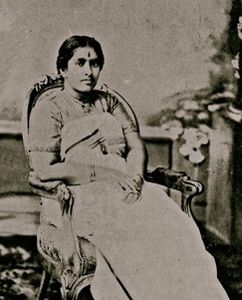Sethu Lakshmi Bayi
| Pooradam Thirunal Sethu Lakshmi Bayik | |||||||||
|---|---|---|---|---|---|---|---|---|---|
| Regent Maharani prev. Senior Queen of Attingal | |||||||||

Regent of Travancore King in 1924
|
|||||||||
| Heir presumptive | |||||||||
| Regency | 6 September 1924 - 6 November 1931 | ||||||||
| Predecessor | Moolam Thirunal | ||||||||
| Heir-Apparent | Chithira Thirunal Balarama Varma | ||||||||
| Born | Mavelikkara | ||||||||
| Died | Bangalore | ||||||||
|
|||||||||
| Kulasekhara dynasty (Second Cheras) | Venad Swaroopam | ||||||||
| Religion | Hinduism | ||||||||
| Occupation | Regent | ||||||||
| Full name | |
|---|---|
| Pooradam Thirunal Sethu Lakshmi Bayi | |
| Regnal name | |
| Sree Padmanabhasevini Vanchidharma Vardhini Maharani Pooradom Thirunal Sethu Lalkshmi Bayi |
Pooradam Thirunal Sethu Lakshmi Bayi CI (1895–1985) was the regent of the Kingdom of Travancore in southern India between 1924 and 1931. She, along with her younger cousin, Moolam Thirunal Sethu Parvathi Bayi, were adopted into the Travancore Royal Family and were the granddaughters of the celebrated painter, Raja Ravi Varma.
In 1924, Maharajah Moolam Thirunal died and his grand nephew and the heir to the throne, Sree Chithira Thirunal, was just 12 years old then. A regency became necessary, since the Maharajah was still a minor. Since Travancore royal family followed the matrilineal system, Sethu Lakshmi Bayi was the head of the family. It was decided, despite the opposition of the minor Maharajah's mother, Junior Maharani Sethu Parvathi Bayi, that Sethu Lakshmi Bayi should be Regent as she was the Senior Maharani until the minor King came of age in 1930. It is to be noted that she was an absolute monarch in her own right as per matrilineal law (unlike regents in the rest of India whose powers were curtailed by tradition and in practice by a regency council) and ruled as the sovereign.
Sethu Lakshmi Bayi's regency continued the progressive administration of Travancore Dynasty and brought forth reforms like abolition of Devadasi system as well as the prohibition of animal sacrifice. Her meeting with Mahatma Gandhi resulted in a royal proclamation by which all the public roads (except the eastern road) to Vaikom Mahadeva Temple were opened to all castes. She also amended the Travancore Nayar Act in relation to the Marumakkathayam system of inheritance and family. Eventually in 1928, the matrilineal system were altogether done away with, introducing patrilineal nuclear family system among Nairs. At the same time, Sethu Lakshmi Bayi was criticized by social reformers for not allowing temple entry for dalits and also for preventing Jawaharlal Nehru from entering the Padmanabhaswamy Temple as Nehru had undertaken a sea voyage. She was also criticized for formulating the notorious Press Regulation Act in 1926 which gagged the Press.
...
Wikipedia
